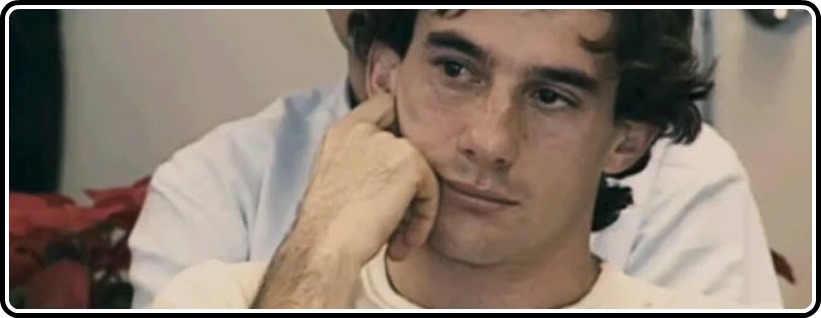Note: Senna had no subtitles in the theater I viewed it in. A moderate chunk of the film is spoken in Portuguese. Keep in mind that any audio interviews by Senna’s family, sports commentators from Brazil and some interview footage of Senna himself was lost on me.
Senna plays more like a narrative feature than any documentary in recent memory. Gripping from the start and refusing to let go, this immersive story will enthrall the viewer regardless of their ignorance of Formula One racing and/or three time Grand Prix world champion, Brazilian driver Ayrton Senna. Entirely comprised of archival footage, Senna offers a rare privilege of access for a documentary, resulting in a wholly distinct experience. It does not feel like you are watching something that has already happened; instead it largely unfolds as if for the first time. Director Asif Kapadia inputs foreshadowing throughout, adding a haunting layer of impending doom leading up to Senna’s fatal crash in 1994.
Thousands of hours of archival footage were sifted through to construct the feature-length film before us. Formula One clearly kept meticulous visual records of everything and it is at times overwhelming just how spoiled the audience gets to be in what they see. A camera was mounted to Senna’s car, allowing us to be in the car with him and the effect is magnificent. Pre-race meetings with the heads of the track and all the drivers were recorded. Instead of hearing from newscasters that Senna walked out of a meeting because of objections regarding pole position, you get to see that meeting.
Additionally, there are home videos of Senna in Brazil as well as footage from his early days of go-kart racing, which prove thematically important, as Senna himself recalls these as his fondest racing memories, citing that it was ‘pure driving’ and absent of politics. There are no talking heads; only audio interviews heard during the archival footage. The absence of talking heads allows a flow of story seldom seen in the medium.
The pacing and structure of Senna revolves almost entirely around his career including several key racing seasons in the late 80’s and early 90’s, his partnerships with McLaren and Williams and his tumultuous rivalry with McLaren teammate and fellow World Champion Allan Prost. It skirts around family and love, largely leaving out anything not having to do with racing; and that’s okay. It allows the film to have an alarming sense of focus. Senna’s rivalry with Prost takes center stage as the Frenchman represents the opposite of his relationship with the sport. Where Senna drove based on intuition and an effort to achieve a closer connection with God, Prost was calculated in his strategy and very plugged into the politics of the game.
His partnership with Williams late in the film is devastating to watch as the film carefully illustrates the events leading to his death. He was clearly not happy with the arrangement and very uncomfortable with the car itself. He gets as close to hesitant acquiescence as a man who has no intention of not racing could get. Knowing what is coming but not being able to stop it, these scenes become increasingly distressing.
Senna was a captivating individual whose sense of self was deeply challenged with all the politics and baggage that came with Formula One. At once deeply religious and patriotic, he was a great source of pride for poverty-stricken Brazil, a position which he clearly took seriously. There was a softness amidst his serious nature that is hard to look away from. On the track he was a risk-taker and off the track he was never afraid to speak his mind, even at the risk of reputational injury within Formula One. Senna’s ability to speak openly about his feelings via interviews allows the man to have a primary voice in a documentary about him after the fact. He was honest, thoughtful and reflective.
If there is a complaint to be had, it is only that it falls slightly short of cracking the nut that is Ayrton Senna as much as one can in 100 minutes time. The film is vague at most concerning the man’s flaws. For example, his recklessness as a driver could have been more examined or at the very least questioned. When a reporter asks him a question that confronts him with this, Senna has a very defensive response. While his reaction to the wording of the question was justifiable, there is a sense that he may have led with his intuition a bit too much. While not an outright knock against the film, there could have been a slightly more layered examination of Senna the man. (Note that the lack of subtitles contributed to this point).
Senna straps the audience to their seats and asks them to hold on. Aided by a memorable score by Antonio Pinto, Asif Kapadia has crafted a loving tribute that briskly and effectively lets you up close and personal with the career of Aryton Senna. There is a tension that feels ever-present, taking the audience back to those Forumla One seasons as if they were happening for the first time. It is impossible not to grow attached to Senna himself. He is admirable and humble with an infectious and unwavering devotion. As the film ends, one is filled with a surge of heartbreak that overwhelms. In short, Senna is a must-see; do yourself a favor and do not miss it.




